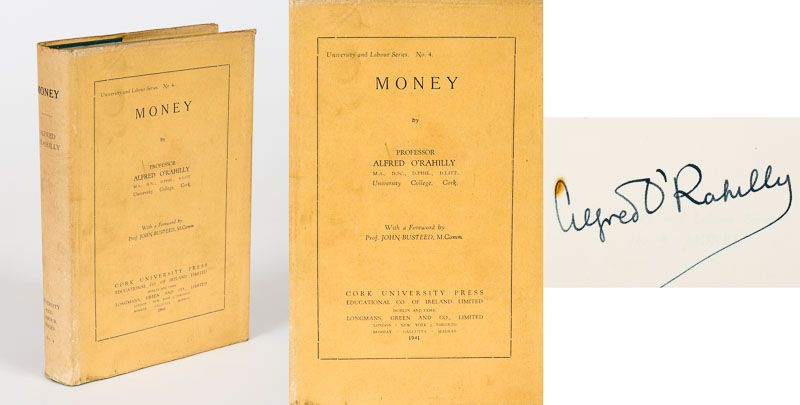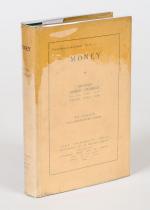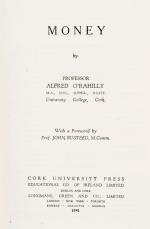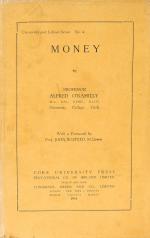O'Rahilly, Money.
Money. With a Foreword by Prof. John Busteed.
Dublin / Cork, Cork University Press, 1941. Octavo. XXX, 441 pages. Original Hardcover with illustrated dustjacket in protective Mylar. The rare dustjacket a little dusty but unclipped and in very good condition. The Volume itself in Near Fine condition with only minor signs of external wear. Minor signs of spotting and foxing only. SIGNED by Alfred O’Rahilly on the endpaper ! Signed editions of this book are very scarce !
Includes for example the following chapters: The Evolution of Money / The Evolution of Banking / Bank-Money / The British Banking System / The Central Bank / Savings / International Trade.
Alfred O’Rahilly (1 October 1884 – 1 August 1969) was a noted academic, president of University College Cork and a Teachta Dála (TD) for Cork City. Born in Listowel, County Kerry and educated at St. Michael’s College, Listowel, and at Blackrock College in Dublin, O’Rahilly went on to third level education at University College Cork, where he completed an MA and PhD.
After a course in scholastic philosophy at Stonyhurst, during which he secured his D.Phil, he was appointed assistant lecturer in the Department of Mathematics and Mathematical Physics in 1914, and made full Professor of Mathematical Physics in 1917. He became Registrar of the college in 1920, and held the post until 1943 when he became President of the University. He spent a year, in 1927, at Harvard studying social and political theory. Cork University conferred on him the degree D.Litt in 1939 and in the same year his massive work on Electromagnetics obtained for him the degree D.Sc. O’Rahilly founded the Cork University Press in 1931.
After the 1916 Easter Rising, O’Rahilly publicly supported Sinn Féin and was elected to Cork City Council as a Sinn Féin and Transport Workers candidate. Arrested early in 1921 for political writings, O’Rahilly was interned in Spike Island prison. Released in October 1921 he was constitutional adviser to the Irish Treaty Delegation. O’Rahilly supported the Anglo-Irish Treaty and in 1922 he composed a draft constitution for the Irish Free State with Darrell Figgis. O’Rahilly lead Irish delegations to the International Labour Organization conferences in 1924, 1925 and 1932, and took on conciliatory role in trade union and employers disputes in Munster.
Standing as a candidate in Cork Borough for Cumann na nGaedheal, he was elected to the 4th Dáil at the 1923 general election. He resigned in 1924, causing a by-election which was won by the Cumann na nGaedheal candidate Michael Egan.
A deeply religious Catholic from early life, O’Rahilly was a member of the Society of Jesus but left before ordination and was dispensed from his vows. He maintained his (sometimes controversial) religious views throughout his life, and became a priest, and then Monsignor, in later years following the death of his wife. He wrote a biography of Fr. Willie Doyle SJ – which was subsequently translated into other languages.
In 1954, Pope Pius XII conferred on him the Pontifical Order of Saint Gregory the Great, the highest distinction awarded by the Pope to Catholic laymen. He was also an advisor on university education to the Archbishop of Dublin John Charles McQuaid and sat on an informal committee from 1950. The committee included O’Rahilly, and the other presidents of the National University of Ireland; Michael Tierney of UCD, Monsignor Pádraig de Brún, Cardinal D’Alton, and Bishops Cornelius Lucey of Cork and Michael Browne of Galway.
O’Rahilly wrote a major survey of electromagnetic theory, Electromagnetics. He opposed Maxwell’s dominant (British) theory of the electromagnetic field and followed the French Catholic physicist, historian of science, and philosopher of science Pierre Duhem in rejecting Maxwell’s field account. As a logical consequence of his rejection of Maxwell, O’Rahilly also rejected Einstein’s theory. O’Rahilly embraced Ritz’s ballistic theory of light and Ritz’s electrodynamics. While Ritz’s theory reduces to Coulomb’s Law and Ampere’s Law, since its derivation is phenomenological, it differs from the Lienard-Wiechert potential. O’Rahilly also wrote against applying the theory of evolution to human society.
Because O’Rahilly thought Cork lacked a social science curriculum he volunteered to teach courses in economics and sociology. When told that they could not spare him from the physics courses, he volunteered to teach an economics course and sociology course along with his physics courses.(Wikipedia)
- Keywords: 20th Century – Rare · Cork City · Cork University · Cork University Press · County Cork · Economic history · Economics · Economics – Rare · Economy · Irish Economic History · Irish History · Irish History – Rare · Signed · Sinn Fein
- Language: English
- Inventory Number: 43345AB
EUR 160,--
© 2025 Inanna Rare Books Ltd. | Powered by HESCOM-Software
















